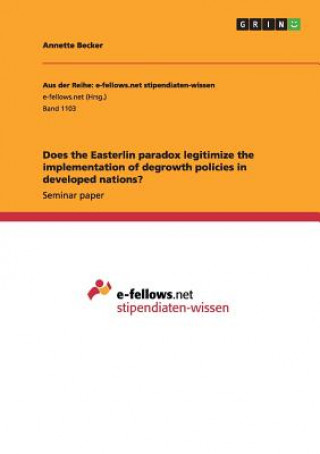
Code: 09213941
Does the Easterlin paradox legitimize the implementation of degrowth policies in developed nations?
by Annette Becker
Seminar paper from the year 2014 in the subject Business economics - Miscellaneous, grade: 2,0, University of Bayreuth (Institut für Philosophie), course: Integration of philosophy and economics, language: English, abstract: Every ... more
- Language:
 English
English - Binding: Paperback
- Number of pages: 28
Publisher: Grin Verlag, 2015
- More about this

37.83 €
RRP: 38.56 €
You save 0.73 €

In stock at our supplier
Shipping in 15 - 20 days
You might also like
Give this book as a present today
- Order book and choose Gift Order.
- We will send you book gift voucher at once. You can give it out to anyone.
- Book will be send to donee, nothing more to care about.
More about Does the Easterlin paradox legitimize the implementation of degrowth policies in developed nations?
You get 95 loyalty points
 Book synopsis
Book synopsis
Seminar paper from the year 2014 in the subject Business economics - Miscellaneous, grade: 2,0, University of Bayreuth (Institut für Philosophie), course: Integration of philosophy and economics, language: English, abstract: Every day, in every industrialized country of the world, journalists and politicians give§out a conscious and unconscious message. It is that better economic performance means§more happiness for a nation. This idea is rarely questioned. We feel we would be more§cheery if our boss raised our pay, and assume that countries must be roughly the same.§The results in this paper suggest that, in a developed nation, economic progress buys§only a small amount of extra happiness. (Oswald 1997, p. 1827)§§Based on Oswald s introductory statement, this paper is going further than refuting the assumption that a§certain kind of utility is solely contingent on absolute earnings. With the interpretation§of utility as happiness, it would mean for the aggregate economy as well as for the§individual that income secures happiness with a rising tendency. Having started with§Oswald, another economist with well-known findings has to be made mention of:§Richard Easterlin, who constructed the hypothesis that from a certain threshold of§developmental achievements on, economic growth is of minor significance to the overall§life satisfaction of a nation. The so-called Easterlin paradox originally arose as data on§richer citizens within a country displayed a higher level of subjective well-being and led§to the assumption that economic growth improve[s] the human lot (Easterlin 1974).§Nevertheless, a comparison amongst well-developed states and over time revealed that§there s little difference of each population with regard to happiness. Thus, it appears§that not the absolute but relative wealth is of import to life satisfaction in crossindividual§and cross-stratum comparisons. Even though it never gained as much§attention as its foreshadowing counterpart by Easterlin, the phenomenon is also§denoted as the relative deprivation theory (Oswald 1999, p. 360), pointing out the§state of deprived happiness poorer individuals in a society suffer.
 Book details
Book details
Book category Books in English Economics, finance, business & management Business & management
37.83 €
- Full title: Does the Easterlin paradox legitimize the implementation of degrowth policies in developed nations?
- Author: Annette Becker
- Language:
 English
English - Binding: Paperback
- Number of pages: 28
- EAN: 9783656889335
- ISBN: 3656889333
- ID: 09213941
- Publisher: Grin Verlag
- Weight: 56 g
- Dimensions: 210 × 148 × 2 mm
- Date of publishing: 17. February 2015
Trending among others
-

The Personal MBA 10th Anniversary Edition
31.37 € -

Personal MBA
14.32 € -22 % -

Market Leader 3rd Edition Intermediate Coursebook & DVD-Rom Pack
34.19 € -6 % -

The Hard Thing about Hard Things
23.40 € -18 % -

Toyota Way, Second Edition: 14 Management Principles from the World's Greatest Manufacturer
28.34 € -22 % -

Slight Edge
16.74 € -19 % -

Good To Great
22.39 € -23 % -

Motive - Why So Many Leaders Abdicate Their Most Important Responsibilities
19.36 € -30 % -

EMPOWERED - Ordinary People, Extraordinary Products
23.40 € -28 % -

When All Hell Breaks Loose
17.44 € -16 % -

Venture Deals
36.21 € -30 % -

Millionaire Real Estate Agent
19.87 € -28 % -

Design Thinking Toolbox - A Guide to Mastering the Most Popular and Valuable Innovation Methods
29.96 € -20 % -

What the CEO Wants You to Know
10.89 € -24 % -

Quality of Earnings
12.80 € -36 % -

ISE Fundamentals of Corporate Finance
78.59 € -

Influential Product Manager
38.43 € -5 % -

Chinese Business Etiquette and Culture
14.82 € -12 % -

Execution
22.49 € -23 % -

Buddha and the Badass
24.41 € -15 % -

Lead with a Story: A Guide to Crafting Business Narratives that Captivate, Convince, and Inspire
21.88 € -23 % -

Wealth Elite
19.66 € -18 % -

Community Visions, Community Solutions
35.91 € -19 % -

Thinking In Bets
17.75 € -15 % -

Eat That Frog!
14.12 € -29 % -

Transformed: Moving to the Product Operating Model
34.40 € -1 % -

Ready, Fire, Aim - Zero to GBP100 Million in No Time Flat
29.75 € -28 % -

Secrets of Power Negotiating - 25th Anniversary Edition
22.79 € -4 % -

All About Asset Allocation, Second Edition
18.25 € -28 % -

The Fearless Organization
26.32 € -19 % -

The Millionaire Real Estate Investor
19.66 € -26 % -
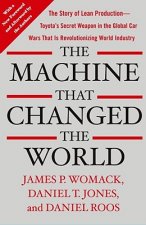
The Machine That Changed the World
16.54 € -21 % -

The Goal
28.04 € -

Karmic Management
15.02 € -21 % -
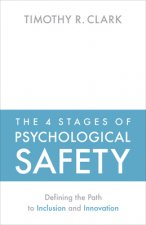
4 Stages of Psychological Safety
18.56 € -19 % -

The Big Book of Dashboards
38.33 € -26 % -
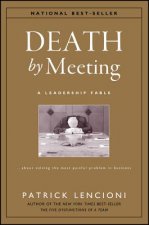
Death by Meeting - A Leadership Fable About Solving the Most Painful Problem in Business
24.91 € -10 % -

Smart Women Finish Rich
17.85 € -11 % -

Ultimate Guide to Dropshipping
12.10 € -

Onward
14.22 € -25 % -

Art of Closing the Sale
16.64 € -17 % -

Smart Couples Finish Rich
16.13 € -23 % -

Introverted Leader
19.87 € -23 % -

Financial Freedom
17.85 € -15 % -

YouTube Formula - How Anyone Can Unlock the Algorithm to Drive Views, Build an Audience, and Grow Revenue
20.47 € -26 % -

Machine That Changed the World
12.90 € -25 % -

Business Essentials, Global Edition
92.21 € -

Business Model Generation - A Handbook for Visionaries Game Changers and Challengers
30.16 € -20 % -

Marketing 5.0 - Technology for Humanity
22.79 € -21 %
Collection points Bratislava a 2642 dalších
Copyright ©2008-24 najlacnejsie-knihy.sk All rights reservedPrivacyCookies



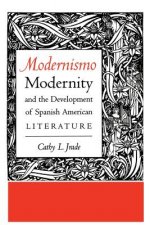

 15549 collection points
15549 collection points Delivery 2.99 €
Delivery 2.99 € 02/210 210 99 (8-15.30h)
02/210 210 99 (8-15.30h)